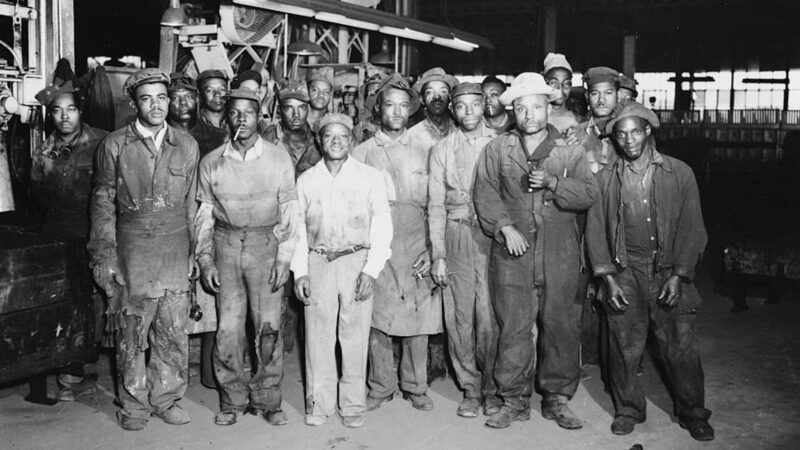How Birmingham reflects an entwined struggle for civil and labor rights
A group of Black laborers pose for a photo at Stockham Pipe and Fittings Company in Birmingham in 1950.
By Olivia McMurrey
Most people are familiar with the 1963 March on Washington and the “I Have a Dream” speech Martin Luther King Jr. delivered at that event. Fewer know the full name of the gathering – the March on Washington for Jobs and Freedom – or that the event focused on economic as well as civil rights.
Walter Reuther, president of the United Auto Workers of America, gave one of the main speeches.
“The job question is crucial,” he said, “because we will not solve education or housing or public accommodations as long as millions of Americans, Negroes, are treated as second-class economic citizens and denied jobs.”
Movements for civil rights and workers’ rights often intersect. But many times the labor part of the picture is overlooked. That’s the case in Birmingham, which is well known for its civil rights history.
Jobs were a key factor in the 1963 Birmingham Campaign, which included the Children’s Marches and Bull Connor’s use of fire hoses and dogs on peaceful demonstrators. While it’s common knowledge that the campaign was about desegregation, Barry McNealy, historical content expert at the Birmingham Civil Rights Institute, said it was also about employment.
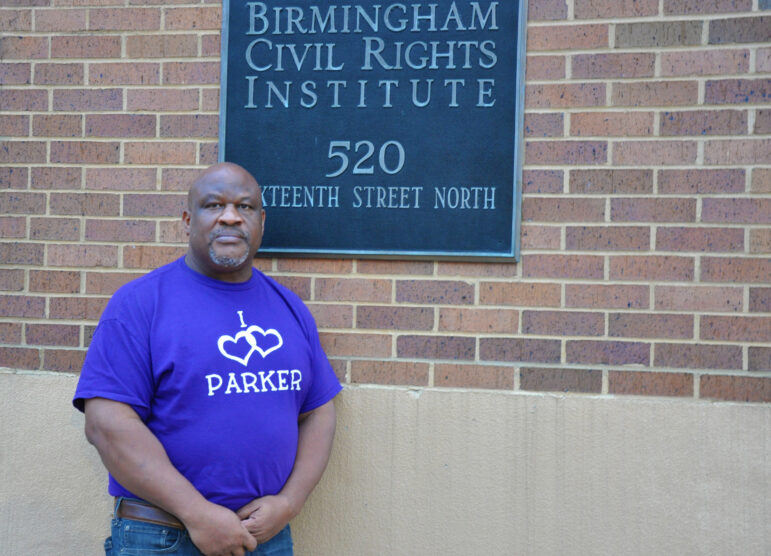
“When we look at Birmingham’s segregation, we also have to look at it from how people were locked out of certain industries,” he said. “A Black person couldn’t, for example, work at Pizitz as an attendant. Black people were not in city government. And so there were so many doors that were just closed to you.”
The Birmingham Campaign ended with an agreement that required a program for upgrading Black employment opportunities. And the Campaign played a big role nationally in bringing about Title 7 of the 1964 Civil Rights Act. Title 7 protects employees and job applicants from employment discrimination.
Logan Barrett, a phD student at Auburn University whose research focuses on labor and race, said the economic-justice aspects of the Civil Rights Movement are often left out of the narrative because those efforts are incomplete.

“If you limit the Black Freedom Struggle story to 1963, you are only telling a story of victory over segregation and Jim Crow laws and Bull Connor,” Barrett said. “You limit the narrative to, that happened in the past and we’ve overcome that. The Black freedom struggle and the labor movement story have been going on well before the 1960s and continued well after, up to the present day.”
This interplay was present in the early years of Birmingham, when the iron and steel industries drew workers from across the rural South and the world. Most men worked 12-hour shifts, seven days a week in the mines or industrial plants.
According to Ty Malugani, education coordinator at Sloss Furnaces National Historic Landmark, 70 to 80% of the industrial workforce was Black and could be paid less than white workers.
“You add in this cheap labor force aspect and that creates the way that Birmingham is able to compete very quickly with established cities in the North,” Malugani said. “Did it work for the workers? That’s where you start seeing the flip side of things.”
Black and white workers toiled in harsh conditions, without safety equipment or training, Malugani said. This led them to form integrated unions as early as the 1870s. A union, then and now, is a group of workers who come together to negotiate wages, benefits, and working conditions with their employer.
When union workers went on strike, companies fought back using race to splinter the workforce.

“The companies are using propaganda in the newspapers to spread this idea that unions want integration everywhere,” Malugani said.
The tactic succeeded. Black union leadership largely disappeared by the 1910s, Malugani said, and strikes were often broken by non-union crews.
Racial division continued to work to the companies’ advantage through the 1960s and beyond. McNealy said employers told Black people to be thankful for whatever they got while telling white people not to ask for too much because Black people would work for anything. Then they promoted social segregation so workers wouldn’t see how much they had in common. The result – in addition to racial tension – was that those who were on top maintained control.
“And there’s a legacy of that that still exists in this country today,” McNealy said.
Erica Iheme is familiar with that legacy. She grew up in predominantly Black North Birmingham and has worked for labor unions across the country. She’s now co-executive director of Jobs to Move America, a policy center that uses grassroots organizing to advocate for good jobs.
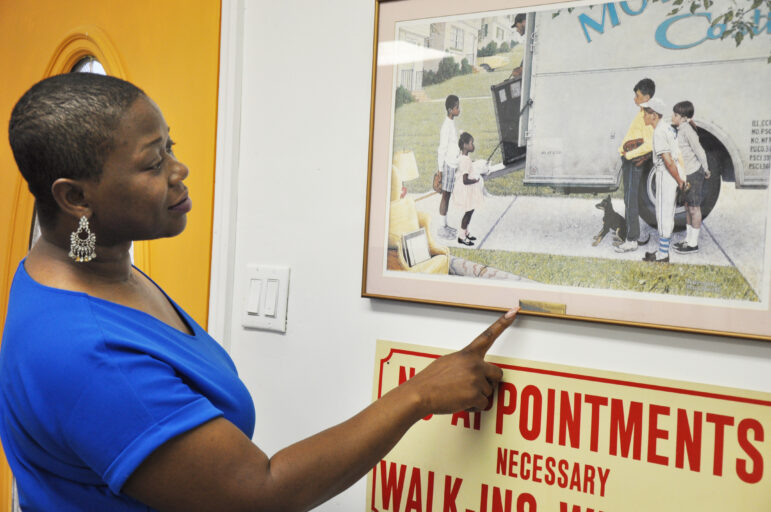
Iheme said a job that pays more than minimum wage isn’t necessarily a good one.
“Are you safe on your job? Are you respected and valued and treated with integrity? Can you have balance and quality of life at home and work? That’s what a good job is,” she said.
Jennifer Bates said today’s economy is sprouting working-class jobs that don’t meet Iheme’s description. Bates is a leader of efforts to unionize a Birmingham-area Amazon warehouse where starting pay is $17.50 per hour and organizers say at least 80% of workers are Black. She said many people in the working class give up some of their civil rights when they walk into their workplaces because they’re worried about losing their jobs.
“A lot of things humans put up with on the job because they have to put food on the table, make sure they have a roof over their family’s heads, make sure they have medical insurance,” Bates said, adding that labor rights should be taught in school, before students are old enough to take their first jobs.
Living wages are difficult to find, too, she said, and that’s affecting entire families.
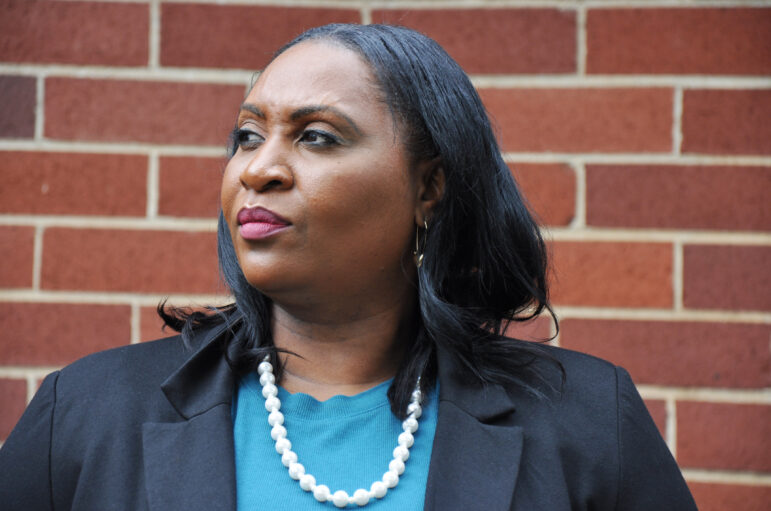
“Parents can’t sit at home with the children because now they’re working 10- and 12-hour shifts in order to make ends meet,” Bates said. “The income is not matching up with the prices of homes, apartments, daycare, gas.”
Bates pointed out the minimum wage of $7.25 per hour hasn’t increased in Alabama since 2009, and union rates have dropped drastically, both locally and nationally, since World War II, according to a 2023 U.S. Treasury Department report. Middle-class share of income has declined along a parallel path, per the Center for American Progress.
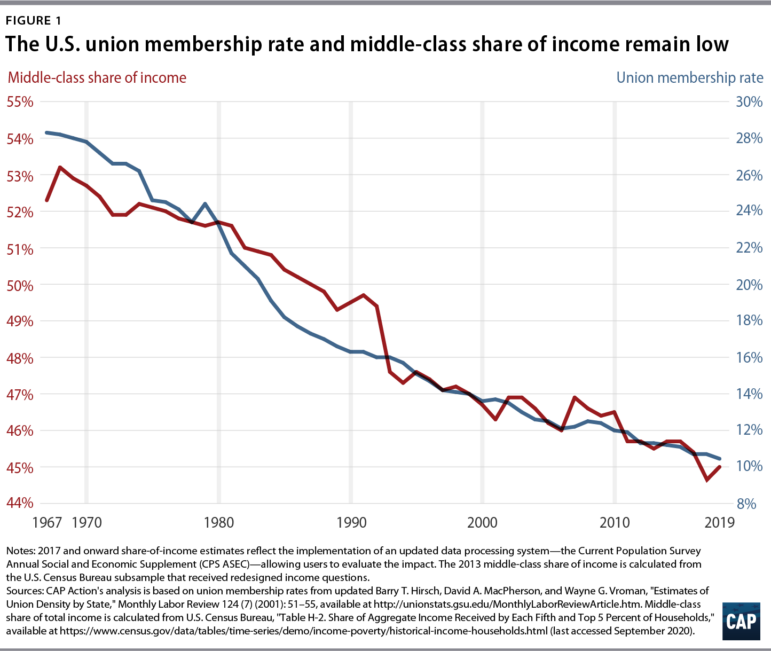
Iheme said that, like Birmingham’s early industrialists, many companies locate operations in the South to take advantage of cheap, non-union, often-minority workforces.
As the United States makes massive investments toward clean energy, Iheme said, communities have an opportunity to help define the modern workplace. She said a brighter future depends on society letting go of racism and on working-class people standing up together.
“We are at the beginning of a brand-new economy, a brand-new type of work, a brand-new type of demand on manufacturing,” Iheme said. “What sense does it make to put brand new fancy jobs and brand new fancy buildings on top of old Jim Crow culture?”
Going forward, McNealy said, labor and civil rights movements will continue to be entwined because civil rights extend beyond race – and, ultimately, labor rights are civil rights.
“We have yet to reach that more perfect union that we talked about in the preamble of the Constitution,” McNealy said. “And so this idea of separating economics from civil rights is just not something that can be done.”
Here’s how world leaders are reacting to the US-Israel strikes on Iran
Several leaders voiced support for the operation – but most, including those who stopped short of condemning it, called for restraint moving forward.
How could the U.S. strikes in Iran affect the world’s oil supply?
Despite sanctions, Iran is one of the world's major oil producers, with much of its crude exported to China.
Why is the U.S. attacking Iran? Six things to know
The U.S. and Israel launched military strikes in Iran, targeting Khamenei and the Iranian president. "Operation Epic Fury" will be "massive and ongoing," President Trump said Saturday morning.
Sen. Tim Kaine calls on the Senate to vote on the war powers resolution
NPR's Scott Simon talks to Sen. Tim Kaine, D-Va., about the U.S. strikes on Iran.
Iran strikes were launched without approval from Congress, deeply dividing lawmakers
Top lawmakers were notified about the operation shortly before it was launched, but the White House did not seek authorization from Congress to carry out the strikes.
Political science expert weighs in on Iran’s nuclear program in light of U.S. strikes
NPR's Scott Simon speaks to Ariane Tabatabai, the Public Service Fellow at Lawfare, about U.S. attacks on Iran and how President Trump's calls for regime change might be received there.

